Dingwall Surname Ancestry ResultsOur indexes 1000-1999 include entries for the spelling 'dingwall'. In the period you have requested, we have the following 125 records (displaying 81 to 90): Single Surname Subscription | | | Buying all 125 results of this search individually would cost £688.00. But you can have free access to all 125 records for a year, to view, to save and print, for £100. Save £588.00. More... |
These sample scans are from the original record. You will get scans of the full pages or articles where the surname you searched for has been found. Your web browser may prevent the sample windows from opening; in this case please change your browser settings to allow pop-up windows from this site. Residents of King Street, Helensburgh (1899)
Street directory of Helensburgh from the 22nd edition of the Helensburgh Directory
DINGWALL. Cost: £8.00.  | Sample scan, click to enlarge
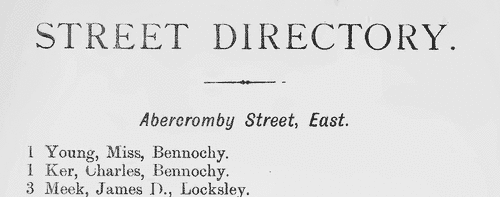
| Long-Lost Relatives: Home Inquiries
(1900)
Each issue of Lloyd's Weekly News, of London, contained a column devoted to searches for Long-Lost Relatives. The inquiries were arranged in three groups: Home Inquiries (i. e., from correspondents in the United Kingdom); Colonial and Foreign Inquiries (from abroad); and Soldiers' and Sailors' Inquiries. Results from all these were grouped together as 'Answers to Inquiries'.
Each column was headed: 'Correspondents MUST give full addresses and the DATES OF THE INQUIRIES to which they refer. We cannot search back numbers, nor print inquiries for "missing husbands." These columns are not intended for inquiries in respect to claimants for money, and no agents, at home or abroad, have any connection with Lloyd's.'DINGWALL. Cost: £6.00.  | Sample scan, click to enlarge

| Missing Next-of-Kin and Heirs-at-Law
(1900)
The Unclaimed Money Registry and Next-of-Kin Advertisement Office of F. H. Dougal & Co., on the Strand in London, published a comprehensive 'Index to Advertisements for Next of Kin, Heirs at Law, Legatees, &c., &c., who have been Advertised for to Claim Money and Property in Great Britain and all Parts of the World; also Annuitants, Shareholders, Intestates, Testators, Missing Friends, Creditors or their Representatives, Claimants, Unclaimed and Reclaimed Dividends and Stock, Citations, Administrations, Rewards for Certificates, Wills, Advertisements, &c., Claims, Unclaimed Balances, Packages, Addresses, Parish Clerks' Notices, Foreign Intestates, &c., &c.' The original list was compiled about 1880, but from materials dating back even into the 18th century: most of the references belong to 1850 to 1880. For each entry only a name is given, sometimes with a placename added in brackets: there may be a reference number, but there is no key by which the original advertisement may be traced. The enquirer of the time had to remit £1 for a 'Full and Authentic Copy of the Original Advertisement, together with name and date of newspaper in which the same appeared'. This appendix to the list was issued in about 1900.DINGWALL. Cost: £4.00.  | Sample scan, click to enlarge
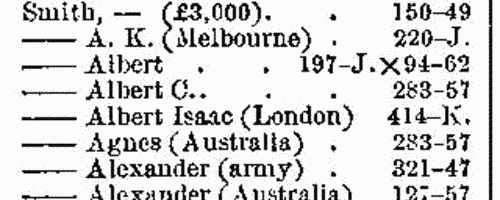
|  London Metropolitan Police
(1892-1902) London Metropolitan Police
(1892-1902)
The London Metropolitan Police Register of Joiners (MEPO 4/336) lists policemen joining the force 1 January 1892 to 23 June 1902 (warrant numbers 77319 to 88811). The register is alphabetical, in so far as the recruits are listed chronologically grouped under first letter of surname. It gives Date of Appointment, Name, Number of Warrant, Cause of Removal from Force (resigned, dismissed, promoted or died), and Date of Removal. A final column of 'Remarks' is largely blank, but occasionally gives an alias or a cross-reference to another warrant number.DINGWALL. Cost: £8.00.  | Sample scan, click to enlarge

|  British artillerymen fighting in South Africa
(1899-1902) British artillerymen fighting in South Africa
(1899-1902)
The Queen Victoria's South Africa Medal was awarded (after her death, in the event) to all who had served honourably in the various campaigns in the Boer War. Returns were made from each unit, and consolidated into nominal roll, of which this is the one for the Royal Artillery. Confusingly, the ledgers used had originally been printed for a register of men transferred (or re-transferred after mobilization) to 1st Class Army Reserve. All the original column headings were therefore struck through, and the roll was prepared with this information: Date of Issue; Regimental Number; Rank; Name; Unit; Medal (a 1 indicating that a medal was awarded); [number of] Clasps; the reference to the source in the original returns, usually starting with AG for papers in the hands of the Adjutant-General, and 68/Art/ for the Royal Artillery records. The final column, normally left blank, was occasionally used for explanatory remarks.DINGWALL. Cost: £8.00.  | Sample scan, click to enlarge
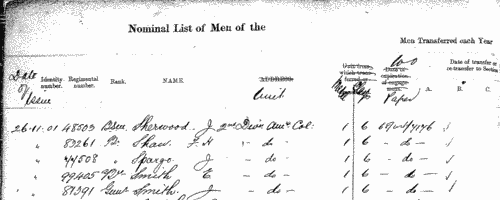
|  Queen's South Africa Medal: Royal Field Artillery: 86th Battery
(1901-1905) Queen's South Africa Medal: Royal Field Artillery: 86th Battery
(1901-1905)
The nominal roll for the Queen Victoria's South Africa Medal - awarded (after her death, in the event) to all who had served honourably in the various campaigns in the Boer War - was compiled from these returns from the individual units. Two sets of form were completed. The main one, as in the sample scan, dates from 1901 and gives regimental number, rank, and full name (surname first), followed by a series of columns relating to different actions - Belmont, Modder River, Paardeberg, Dreifontein, Wepener, Johannesburg, Diamond Hill, Belfast, Wittebergen, Defence of Kimberley, Relief of Kimberley, Defence of Mafeking, Relief of Mafeking, Cape Colony, Orange Free State, Transvaal, Rhodesia, Talana, Elandslaagte, Tugela Heights, Defence of Ladysmith, Relief of Ladysmith, Laing's Nek, and Natal; each entitled the man to a separate clasp to the medal, and a tick or a Yes in the appropriate column indicates the man's actual physical presence in that battle. A final column for remarks is important in those cases where the man was no longer in the unit, by removal, death or desertion. The second form that sometimes occurs was returned in 1905, and covers men entitled to the Second South African War Medal and Clasps. It lists men by number, rank and name, checks whether they had claimed the Queen's South Africa Medal, and then enquires as to their suitability as to three Colony Clasps, which could be awarded for service in the Cape, Orange Free, or Transvaal; whether entitled to Date Clasps (South Africa 1901 and South Africa 1902); whether also entitled to the King's South Africa Medal; any other corps in which served in South Africa; and remarks (such as becoming non-effective, forfeiture, &c.) WO 100/143DINGWALL. Cost: £8.00.  | Sample scan, click to enlarge

| Steam Engine Makers in Newcastle
(1910)
The Steam Engine Makers' Society, a trades union, ended 1910 with 13,401 members in 144 branches. The 86th Annual Report gives a full list of members for each branch, followed by Travelling Expenses subsidised by the branch (with names and dates); Unemployed Expenses (with names and dates); Superannuation, Sick and Funeral Expenses (all with names and dates).DINGWALL. Cost: £6.00.  | Sample scan, click to enlarge

| Civil Servants and Office Holders
(1913)
The Imperial Calendar gives lists of officials and office-holders throughout England, Wales, Scotland and Ireland
DINGWALL. Cost: £4.00.  | Sample scan, click to enlarge
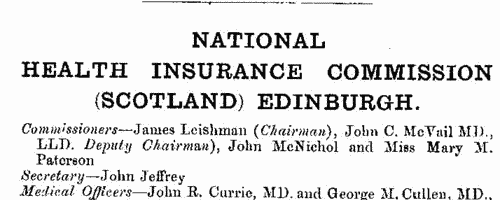
| Boys entering Marlborough College
(1915)
The public school at Marlborough in Wiltshire was founded in 1843. In 1952 this, 9th, edition of the college register was published, being a revision by L. Warwick James of the 8th edition (of 1936): but for the years before 1936 it does not merely repeat the 8th edition, because Warwick James was able to correct the 19th-century entries with information from newly-discovered letters and books from 1843 to 1853, and the school lists from 1844 onwards. The roll is arranged by year, and within each year by term of entrance, and then alphabetically by surname within each term. Each boy is assigned a number within the year: then his name is given, surname first, and, in brackets, his house. The houses within the college were called B1, B2, B3, C1, C2 and C3, and the Lower School (L Sch); the out college houses were Preshute, Priory, Cotton, Hermitage, Littlefield, Barton Hill, Summerfield and Upcot. Then there is given the boy's father's name (surname and initials) and address (at entrance), the boy's date of birth (b) and month of leaving (l). Where the boy represented the school at Rugby football (XV) or cricket (XI), in the rifle corps (VIII, or RC XI), that is indicated. There is a brief summary of achievements in later life, and, where known, and date of death or (in italics) address as in 1952. DINGWALL. Cost: £4.00.  | Sample scan, click to enlarge
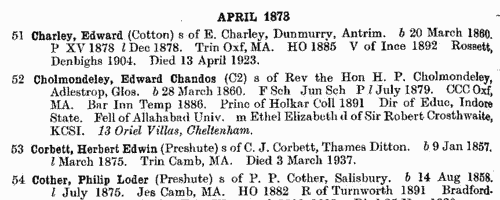
| Naval Ratings Killed in 1915
(1915)
The monthly lists of Royal Navy ratings killed from the start of the Great War from January to December 1915 are arranged alphabetically by surname and christian names, with rank, and official number. The lists include marines, merchant navy, reservists, and a few civilian canteen staff also killed in the conflict. Full names are given, except for a few cases where a middle name is represented only by an initial.
DINGWALL. Cost: £4.00.  | Sample scan, click to enlarge

|
Research your ancestry, family history, genealogy and one-name study by direct access to original records and archives indexed by surname.
|













